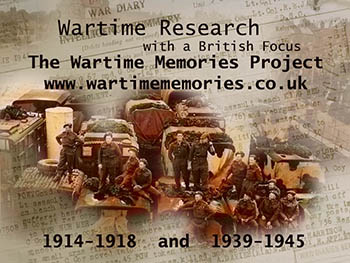|
|
|
Those known to have sailed in HMS York during the Second World War 1939-1945. - Beddingfield MM. William. CSM. (d.16th Jan 1944)
- Clarke Firth. Pte.
- Cook James. PO.
- Dixon MiD Robert Noel. PO.(Tel)
- Griffin Joseph William.
- Mckay Eldon Vincent. Sgt.
- Rogavin Dick J.. RMN2
- Schmidt Lester John. CPO.
- Seddon MM. Peter. Pte.
- Sleet MID George William. CPO
- Wallace MC. Herbert Noel. Mjr. (d.6th Jun 1945)
The names on this list have been submitted by relatives, friends, neighbours and others who wish to remember them, if you have any names to add or any recollections or photos of those listed,
please
Add a Name to this List
Records of HMS York from other sources.
|
|
|
The Wartime Memories Project is the original WW1 and WW2 commemoration website.
Announcements

- 1st of September 2024 marks 25 years since the launch of the Wartime Memories Project. Thanks to everyone who has supported us over this time.
- The Wartime Memories Project has been running for 25 years. If you would like to support us, a donation, no matter how small, would be much appreciated, annually we need to raise enough funds to pay for our web hosting and admin or this site will vanish from the web.
- 18th Dec 2024 - Please note we currently have a huge backlog of submitted material, our volunteers are working through this as quickly as possible and all names, stories and photos will be added to the site. If you have already submitted a story to the site and your UID reference number is higher than
265120 your information is still in the queue, please do not resubmit, we are working through them as quickly as possible.
- Looking for help with Family History Research?
Please read our Family History FAQs
- The free to access section of The Wartime Memories Project website is run by volunteers and funded by donations from our visitors. If the information here has been helpful or you have enjoyed reaching the stories please conside making a donation, no matter how small, would be much appreciated, annually we need to raise enough funds to pay for our web hosting or this site will vanish from the web.
If you enjoy this site
please consider making a donation.
Want to find out more about your relative's service? Want to know what life was like during the War? Our
Library contains an ever growing number diary entries, personal letters and other documents, most transcribed into plain text. |
|
Wanted: Digital copies of Group photographs, Scrapbooks, Autograph books, photo albums, newspaper clippings, letters, postcards and ephemera relating to WW2. We would like to obtain digital copies of any documents or photographs relating to WW2 you may have at home. If you have any unwanted
photographs, documents or items from the First or Second World War, please do not destroy them.
The Wartime Memories Project will give them a good home and ensure that they are used for educational purposes. Please get in touch for the postal address, do not sent them to our PO Box as packages are not accepted.
World War 1 One ww1 wwII second 1939 1945 battalion
Did you know? We also have a section on The Great War. and a
Timecapsule to preserve stories from other conflicts for future generations.
|
|
Want to know more about HMS York? There are:13 items tagged HMS York available in our Library There are:13 items tagged HMS York available in our Library 
These include information on officers, regimental histories, letters, diary entries, personal accounts and information about actions during the Second World War. |
|
Pte. Peter Seddon MM. 2nd Battalion Duke of Wellingtons (West Riding) Regiment Initially, my dad, Peter Seddon, was in the 6th Manchester Regimen in England before being sent to India and being transferred to the 2nd Battalion, Duke of Wellingtons Regiment in late 1942.
While in India, he was put in the 23rd Chindit (Reserve) Brigade and received intense training to prepare for the Second Chindit Expedition. However, when the Japs invaded Kohima and Imphal, the 33rd & 76th Columns of the 23rd Brigade were sent to Kohima in April 1944.
Based in the Naga Hills, they operated behind enemy lines in order to stop food, communication and medication reaching the Japs. They contributed to the starvation of the enemy which was the decisive factor in that battle. Although not engaged in major battles they accounted for large numbers of Japenese stragglers and foragers and suffered 158 battle casualties themselves.
The defeat of the Japanese at Kohima and Imphal was a turning point. Previously the Japs had won the Battles of Rangoon and Arakan. They had seemed unbeatable as they were harded soldiers who had been fighting the Chinese since 1931. They had suicide squads and were brainwashed to die for their Emperor. They were also very vicious and inhumane towards their enemies. In addition, the British Army's job was made harder as it suffered from lack of resources. The majority of money went to the fight in Europe.
In January 1945, my Dad was then transferred to 1st Battalion, West Yorkshire Reg, 17th Indian Division, where he was involved in Operation Extended Capital. The Burma Campaign intended to take back Rangoon from the Japs.
My Dad was temporary made Lance Corporal in 1945. While taking part in the fierce Battle in Meiktila, he earned the Military Medal for rescuing his fellow soldiers wounded in battle.
In 1945, the Japs were defeated again.
My Dad had Malaria 12 times while in India and Burma.
It wasn't until late 1945 that my Dad returned to England. He was nearly 26 years by then.
|
Joseph William Griffin 281st Kings Squadron My Grandad, Joseph Griffin served from 1937 to 1945. He
did his training at Deal in Kent, I think.
His first ship was the Royal Sovereign which he was not on for too long. Then he was assigned to HMS Southampton from which I have a very interesting journal he kept from the first day he arrived on her to her last day when she was badly damaged by four direct hits from Stuka dive bombers just off Malta. There were a lot of men killed into the eighty's and more than one hundred injured, the ship was that badly damaged she had to be abandoned. The men were saved by other boats in the convoy. He watched as two Navy destroyers torpedoed her to sink her so she could not be repaired by Axis forces.
The men were taken to Alexandria where they were looked after. Later my grandfather was assigned to HMS York which was guarding commercial ships in the Mediterranean and moving men and equipment from Greece to Egypt amongst other duties. On one such occasion collecting troops from Souda Bay she was surprised by, I think, four Italian motor torpedo launches of which two were successful in damaging the York who was beached in Souda Bay, Crete. I know he was hiding in caves on Crete and was there through the Battle of Crete and didn't leave until April 1941.
If anyone has any more information about the crews time in Crete I would be very grateful if they would post it.
Thanks in advance.
|
PO. James Cook HMS York 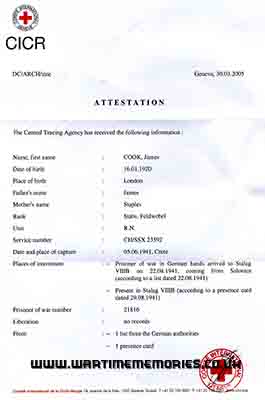 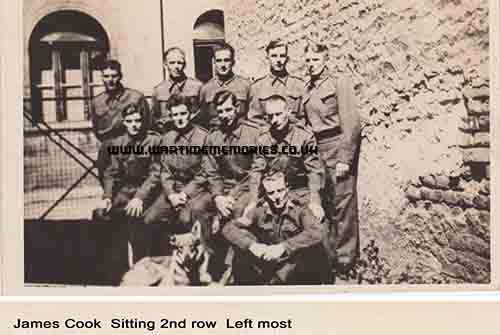 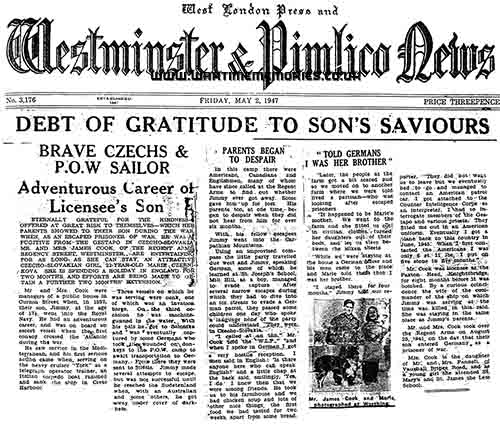 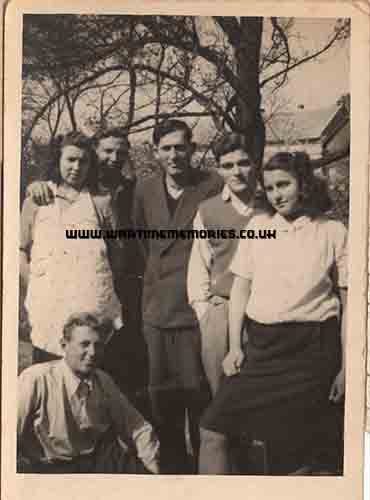 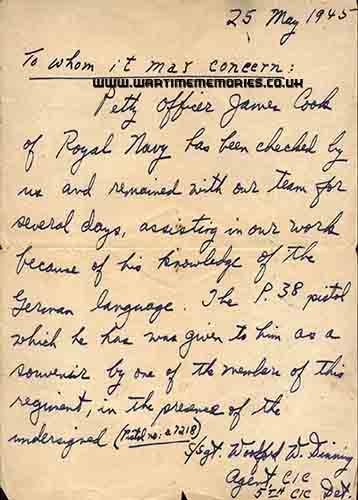 Jimmy Cook was born in 1920 in Rotherhithe, London, England, In 1937, at the age of 17, he ran off to sea and joined the Royal Navy. He was trained as a telegraphist and in July 1939 after his training, he was posted as an Ordinary Telegraphist to HMS York, the command ship of the 8th Cruiser Squadron on the America and West Indies Station stationed in Bermuda.
When war was declared, HMS York was in Bermuda and sailed for Halifax, Nova Scotia with Jimmy aboard. The convoys began immediately and the York was an escort for the first convoy to sail from there, HX 1, on Sept 16th.
Over the next two years HMS York participated in a number of different engagements, continuing with convoy duty during the height of the Battle of the Atlantic, the abortive invasion of Norway in April/May of 1940 and the defense of Crete in 1941.
Jimmy had a number of different assignments on the York. Being a telegraphist, he was involved in landing or evacuating troops and other special tasks, in the Norway invasion and in the Mediterranean. During one of these assignments, an invasion barge he was on was sunk and Jimmy and his comrades were machine gunned in the water. After the York was sunk in March 1941, Jimmy remained on Crete until his capture on the 5th of June 1941. We have no details as to how he was captured, only the record from the Red Cross listing him as a prisoner of war. Jimmy was taken to the Transit Camp in Salonika. It was a hard journey on foot with the wounded on donkeys. He later said that he swore he would never walk anywhere again if he could avoid it and as long as I knew him, he kept to his word. The conditions at Salonika were hard and during that time he contracted Sand Fly fever. Eventually, he was shipped by cattle car to Stalag VIIIB in Silesia where Stabs. Feldwebel (Petty Officer) James Cook arrived on August 22nd 1941 as noted by the Red Cross.
Stalag VIII-B, Lamsdorf, located near the small town of Lamsdorf (now called Lambinowice) in what was then known as Upper Silesia near the Czechoslovakian border. Jimmy was kept there for 3 years until his escape in late 1944. We have two pictures that were taken in work camp E-574. Ziegenhals. There were never many comments on life in the prison camp from Jimmy. There was little food and he picked up the habit of eating extremely quickly. The prisoners were given incredibly smelly cheese from time to time and he said many wouldn't or couldn't eat it, but since he had no problem with it, it helped his diet.
My father always said that most of the guards were just regular guys trying to keep their heads down... and he mentioned that mostly that they didn't get any better food than the prisoners. When the prisoners received Red Cross parcels, they traded the goodies with the guards for items that they needed. Jimmy had a great affinity for picking up languages and learned German in the camp. By the end of the war, he would be fluent. Generally, he didn't seem to harbour any ill feeling for the German guards. Although he did mention a guard who stabbed him in the hand with a bayonet for preventing his work detail from doing work that wasn't allowed.
But plans were being made and after a few failures, in late 1944, Jimmy, an Australian and some other men slipped under the wire and escaped their camp. Once they were free and on the move they went into the Carpathian Mountains. Using an improvised compass the little party traveled due west and managed to evade capture. They had several narrow escapes. Once they had to dive into a stream to evade a German patrol. Finally they passed some children one day who spoke a language none of the party could understand. They realized they were in Czechoslovakia. Jimmy related "I called at an inn and when I spoke German I got a very hostile reception. I then said in English...Is there anyone here who can speak English? ... And a little chap at the back said... Yes, I do... I knew then that we were among friends. He took us to his farmhouse and we had chicken soup and lots of other things. It was the first food we had tasted for two weeks apart from some bread. Later, the people at the farm got a bit scared and so we moved on to another farm where we were told lived a partisan who was looking after escaped prisoners. We went to the farm and she fitted us out in civilian clothes, turned her daughters out of their beds and let us sleep between real sheets."
The family was named Czernikova and one of the daughters was named Marie, to whom Jimmy became attached. "While we were staying at the house a German officer and his men came to the place and Marie told them that I was her brother." Jimmy stayed with them for four months. Eventually, even though they did not want them to leave, the little party had to go. They continued on their journey and eventually arrived at the American lines and contacted an American patrol car. After his initial interrogation by the Americans and because of his knowledge of German, Jimmy was asked to help the 5th Counter Intelligence Corps as an interpreter. Always willing to do his bit, he helped interrogate members of the Gestapo and others. The Americans fitted Jimmy out in an American Army Air Forces uniform and gave him a pistol as a souvenir, see the letter telling whom it may concern about this souvenir. The author of the letter, Woodford W Dinning, became a lawyer in Demopolis, Alabama until his death in 1998. Eventually, the Americans arranged for a plane and Jimmy returned to England in June 1945. When Jimmy first contacted the Americans he was only 95 lbs but after five months he put on an additional 70lbs. At this point his time with the military came to an end. He was released from service in November.
|
PO.(Tel) Robert Noel Dixon MiD HMS York Robert Dixon was a member of the crew when HMS York was sunk.
|
CPO. Lester John Schmidt USS New York At the age of 17 Lester Schmidt took to the sea via the U.S. Navy, serving in both the Atlantic and Pacific theatres aboard the battleship New York, cruisers Quincy and Miami, as well as the Snatch, Laysan Island and Talladega warships. He rose through the ranks to Chief Petty Officer and earned multiple decorations.
|
Pte. Firth Clarke West Yorkshire Regiment Pte. Firth Clarke was captured early in the war and held prisoner through to the end. He was held in Stalag XXB. He rarely spoke of his time there, but on occasions told of stealing sugar hidden in a drum after a concert and getting German guards to help lift it as it was too heavy, of having shrapnel removed from his leg/ankle by German doctors, of walking home through Poland and refusing to remove his boots in case he was never able to get them back on. He was fond of boxing and gambling.

This second picture is of Firth at Stalag XXb (he did spend a short while in XXA before being moved to XXB) 
Firth after the war (sadly he died in 1960) – he had had time to recover from the weight loss caused by walking home through Poland, so I guess the picture is about 1947/8?
If anyone recognises him, I would love to get in touch and find out more.
|
Mjr. Herbert Noel Wallace MC. 5th Btn. East Yorkshire Regiment (d.6th Jun 1945) I know little of my Great Uncle's war and am keen to find out more. Herbert Wallace won his Military Cross for action in North Africa on March 23rd whilst commanding C Company. His citation reads:
"During March 23rd, 1943, Major Wallace was in command of a battalion of the East Yorkshire Regiment which was holding a forward sector of the capture enemy locality of Ksiba Quest. During the day the locality was attacked twice by infantry and several times by tanks and was subjected to repeated and heavy shelling. Major Wallace displayed great courage and resource in dealing with several difficult situations. On one occasion a party of infantry penetrated the trench system of the defences; he immediately organised a counter-attack which successfully threw the enemy out. On another occasion, when orders were received to withdraw the garrison, Major Wallace was ordered to lead and direct the withdrawal through enemy positions. This he did with great skill and coolness, leading the force through an enemy minefield containing anti-personnel mines and through fierce artillery and machine-gun fire with but slight casualties. Throughout the entire operation Major Wallace was a splendid example and inspiration to his men. He remained cool and cheerful when the situation was most serious, and it was to a great extent due to his effort that the defence remained unbroken and the withdrawal was successfully carried out."
This is all I know of the man - a single day in his life of 28 years. He died on April 6th, two weeks later.
|
CPO George William Sleet MID HMS Havoc Following is a synopsis of my uncle's wartime experiences in the Royal Navy up to and during his capture and internment in the POW camp in Laghouat in Algeria. George William Sleet was a career sailor; eventually rising through the ranks to become Chief Petty Officer.
Everyone in the family was having narrow escapes. The radio news bulletins had mentioned that Uncle George’s ship, H.M.S. York, had been torpedoed and run aground in Suda Bay, Crete, where the crew had scuttled it and got ashore to hide in the caves. His ship and sister ship, H.M.S. Exeter, had chased the German pocket battleship Graf Spee to the River Plate and had seen it scuttled before joining the Mediterranean fleet. Now they were holed up and waiting for rescue. The Germans had invaded Crete and were trying to find the source of the radio messages Uncle George was sending to Alexandria. As they were deep in caves, bombing was useless, and eventually the crew was rescued by the destroyer H.M.S. Hero and taken to Alexandria where he was put on the battleship H.M.S. Queen Elizabeth. He was Mentioned in Dispatches for his part in the rescue so my grandparents were very proud of him.
Later, Uncle George sent a letter from Alexandria to say he was now serving on H.M.S. Havoc and protecting the Mediterranean convoys. Then there was word that H.M.S. Havoc had been sunk and the survivors had managed to get ashore at Tunisia, where the Arabs had turned them over to the Vichy-French army who sided with the Nazis. Grandma was to get a censored postcard later from a POW camp in Laghouat in Algeria, so the news was confirmed.
As the North Africa campaign wore on, Uncle George was freed from the POW camp by the invading English and American troops and made his way home. When he did finally arrive, the family was shocked at how thin he was. His shin bones stuck out on his legs, and he had lost a lot of teeth through bad food and lack of it. He said everything was soaked in olive oil and solid food was rare, hence the bad teeth. He also had sand sores where they had to sleep and sit on the desert sand as no chairs or beds were available. The POWs were treated abominably, but he did say that they all felt a lot better after they had gone down to the Arab villages and given the inhabitants a beating up for their part in the treatment they received. Apparently any escape from the camp was doomed, because the Arabs caught the escapees and returned them to the Germans. He was home for sometime and the family did its best to make it enjoyable for him. He wouldn’t go into the shelters at night, though, but the air raids had lessened considerably anyway.
|
RMN2 Dick J. Rogavin U.S.S. Moose I was 16 years old when I had my first contact with a British Navy Man. We lived in Sunnyside, Queens, Long Island, NY during the war years. My step Dad worked at the Brooklyn Navy Yard when the HMS Penelope came in for major repairs, the year was 1942. Folks at the Navy Yard were asked to invite members of the HMS Penelope's crew to stay at their homes during her stay at the "Yard". I believe the young man who stayed with us was a CPO but I have been unable to find his name, much to my sorrow. Needless to say I was a very impressed young lad with this young British Navy Man. I am certain he influenced my decision to join the U.S.N. which I did when I was 17. This British Navy man stayed with us for a couple of months while the repairs were being carried out on his ship, it was a fantastic event for a young impressionable 16 year old lad. I served in the USN and was a radioman on the USS Moose in the Pacific area during World War 11
|
Recomended Reading.Available at discounted prices.
|
|
|



